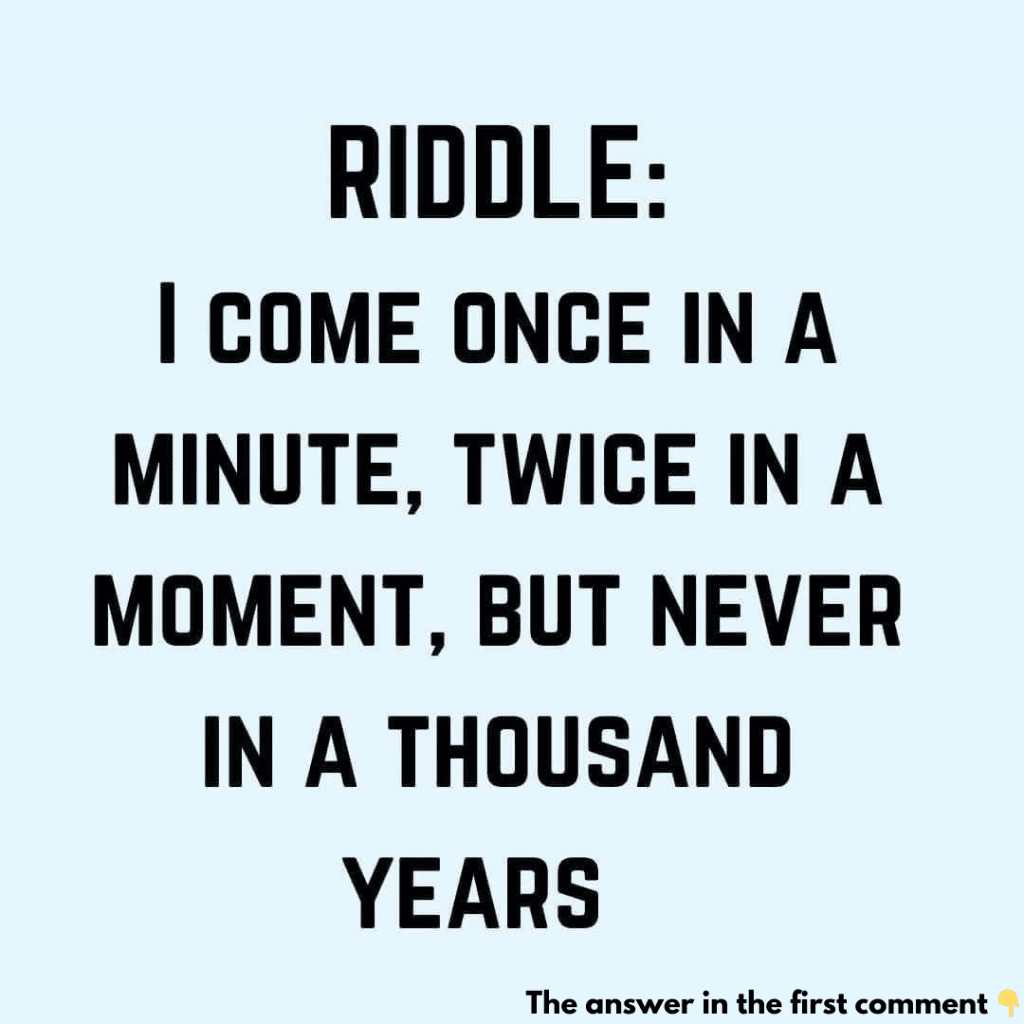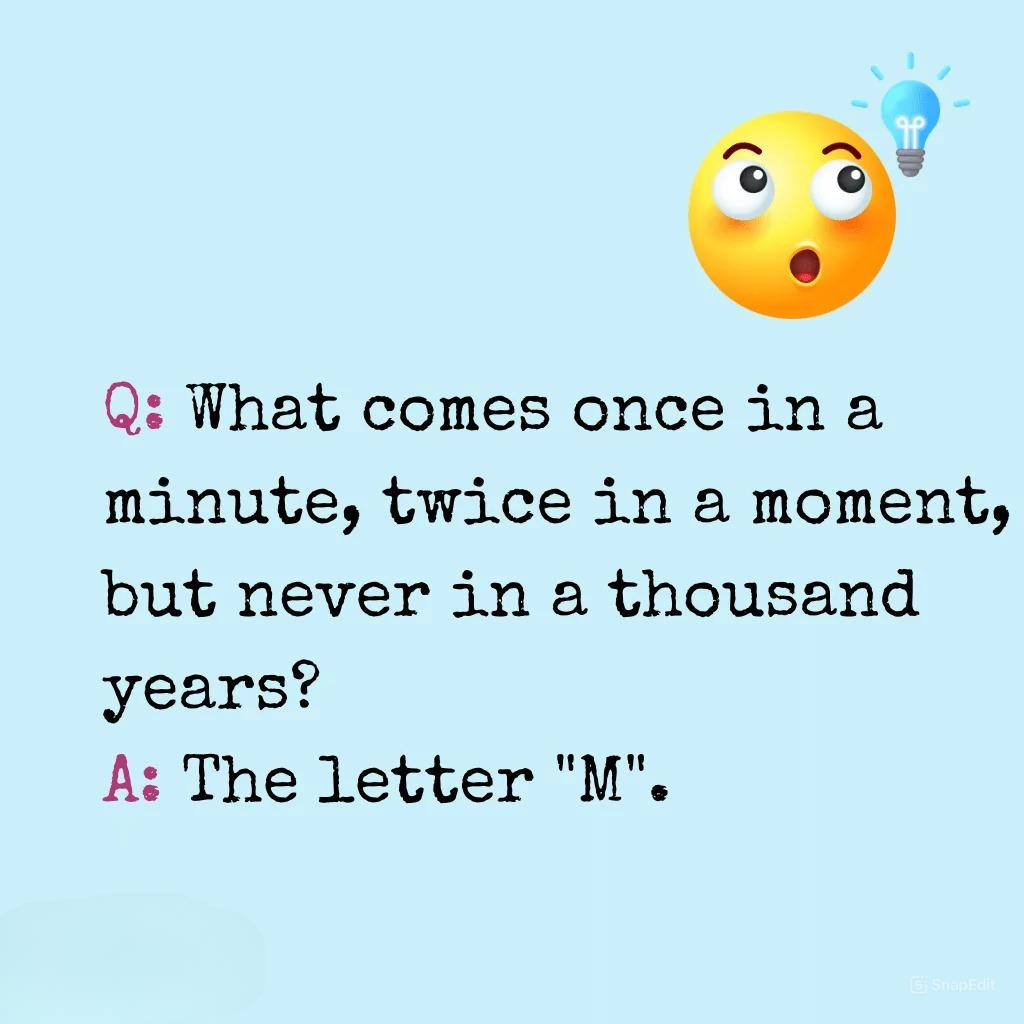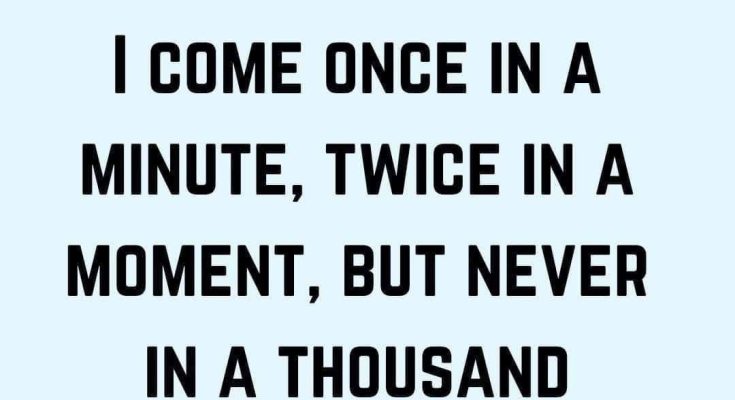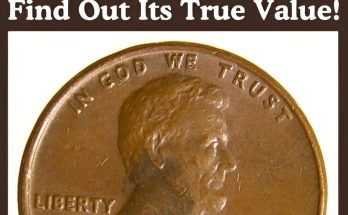Riddles have a way of teasing our brains, making us think outside the box, and stretching our imagination. Today’s challenge is one of those timeless puzzles that seems simple at first but quickly turns into a head-scratcher. Here’s the riddle:
“What comes once in a minute, twice in a moment, but never in a thousand years?”
At first glance, this riddle appears to revolve around time, but the answer is much more clever and unexpected. Let’s dive into the mystery and break it down step by step.

Decoding the Riddle: A Step-by-Step Breakdown
The beauty of riddles lies in their deceptive simplicity. This one, in particular, tricks you into focusing on time. Here’s how to unravel its true meaning:
1. “What comes once in a minute”
The riddle starts by directing us to the word “minute.” At first, you might think it’s referring to an event or phenomenon that happens every 60 seconds. But the answer isn’t about the concept of time—it’s hidden within the letters of the word itself.
- Look closely at the word minute.
- What stands out? The letter M appears exactly once in this word.
This gives us our first clue: the letter M is key to solving the riddle.
2. “Twice in a moment”
The next clue involves the word “moment.” Following the same logic as before, let’s examine the letters in this word.
- In the word moment, the letter M appears not once but twice.
- This confirms that the letter M aligns with the second part of the riddle.
So far, it’s clear that M is central to the solution.
3. “But never in a thousand years”
Finally, we arrive at the last part of the riddle. The phrase “a thousand years” seems vast and unmeasurable, but the solution lies in its simplicity.
- Look at the letters in the phrase a thousand years.
- Notice something? The letter M does not appear at all in these words.
This completes the puzzle, confirming that the answer is indeed the letter M.
The Clever Answer: The Letter “M”
If you guessed M, congratulations! You’ve cracked the code. The brilliance of this riddle lies in its ability to misdirect, making you think about time when the solution is rooted in the structure of the words themselves.

Why This Riddle Stumps So Many People
Riddles like this one are designed to challenge conventional thinking. Here are a few reasons why it trips people up:
1. Overthinking the Problem
When we hear words like “minute” and “moment,” our minds immediately connect them to time. This natural association makes it harder to consider alternative interpretations.
2. Ignoring the Details
The key to solving this riddle lies in focusing on the details—specifically, the letters in the words. Many people overlook this, focusing instead on the broader context.
3. Literal Thinking
Riddles often rely on abstract or lateral thinking. Approaching them too literally can lead to confusion and missed opportunities to find the answer.
Why Puzzles Are Great for Your Brain
Solving riddles isn’t just fun—it’s also great for your mental health. Here’s why:
1. Boosts Cognitive Skills
Puzzles improve your ability to think critically, analyze details, and solve problems creatively.
2. Enhances Memory
By challenging your brain to recall and process information, riddles can sharpen your memory and mental agility.
3. Promotes Relaxation
Engaging in puzzles provides a healthy distraction, helping to reduce stress and improve your mood.
4. Encourages Out-of-the-Box Thinking
Riddles force you to think in unconventional ways, broadening your perspective and enhancing your problem-solving skills.
Tips for Solving Riddles Like a Pro
If you enjoyed this puzzle, here are some strategies to become a riddle-solving master:
1. Read the Riddle Slowly
Pay attention to every word. Riddles often hide clues in plain sight.
2. Break It Down
Analyze each part of the riddle separately, just like we did with “minute,” “moment,” and “a thousand years.”
3. Consider Alternative Meanings
Don’t take everything at face value. Look for wordplay or hidden meanings.
4. Practice Regularly
The more riddles you solve, the better you’ll get at recognizing patterns and avoiding common pitfalls.
Join the Fun: Share Your Experience!
Did you guess the answer correctly? If so, how long did it take you? If not, what led you astray? Share your thoughts in the comments below and see how others approached the puzzle.
Don’t forget to challenge your friends and family with this riddle. It’s always fun to see who solves it first—or who gets hilariously stumped!
Conclusion: The Joy of Wordplay
Riddles like this one remind us of the joy of discovery. They push us to think creatively, pay attention to details, and embrace the unexpected. The answer, M, may seem simple in hindsight, but the journey to uncover it is what makes the riddle so engaging.
So, the next time you encounter a puzzle, remember to slow down, think critically, and, most importantly, enjoy the process. After all, every solved riddle is a small victory for your brain!



